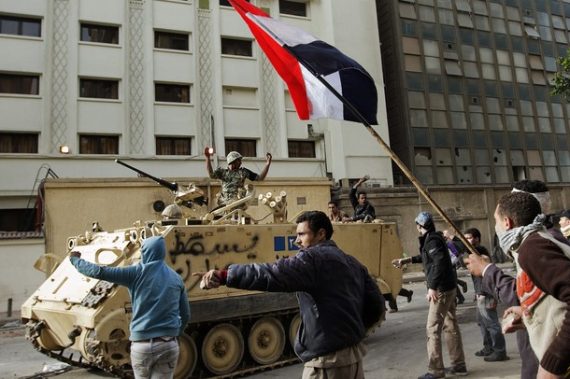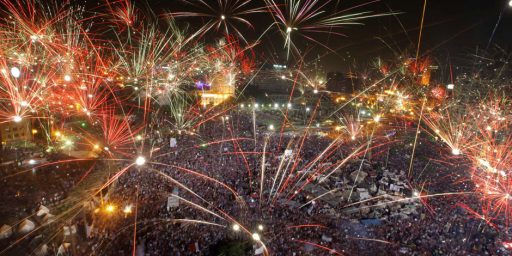Egypt and the Limits of US Power
The US has limited influence over events in Egypt--something that recent history should underscore (although not everyone appears to understand this fact).
 There is no doubt that the US government has some level of influence with the Egyptian government and therefore some influence over the events currently unfolding there. Egypt has been a US ally for many decades and is currently (at least the last time I checked) in the top five in US direct aid (along with, in no particular order, Iraq, Afghanistan, Israel, and Colombia). Egypt has been a key actor in the Middle East and there is also little doubt that internal instability there will have profound effects on the region, and hence US (and global) interests in the outcome of the current upheaval in a way that, say, Tunisia never was going to generate.
There is no doubt that the US government has some level of influence with the Egyptian government and therefore some influence over the events currently unfolding there. Egypt has been a US ally for many decades and is currently (at least the last time I checked) in the top five in US direct aid (along with, in no particular order, Iraq, Afghanistan, Israel, and Colombia). Egypt has been a key actor in the Middle East and there is also little doubt that internal instability there will have profound effects on the region, and hence US (and global) interests in the outcome of the current upheaval in a way that, say, Tunisia never was going to generate.
Having noted that, and to agree with the basic tenor of James Joyner’s, I think we all have to step back and recognize, to James’ point, that a cautious response from the US government is the only prudent course to follow.
More importantly, however, is to recognize that the US is not in control of this situation. The right words from the President will not produce a particular outcome. Indeed, at the moment it is rather difficult to know what the set of possible outcomes are and which of those is to be preferred.
Indeed, this seems like a good time to point out that troops on the ground for the better part of a decade in Afghanistan and Iraq should have demonstrated, once and for all, that US ability to create preferred outcomes is a whole lot harder than most Americans like to think it is. I keep assuming that the lessons of those wars will sink in in this regard, but apparently not. For example, as Conor Friedersdorf pointed to a Glenn Reynolds post wherein Reynolds opines “Had we pushed the overthrow of tyrannical Arab regimes post-Iraq (as some unsuccessfully urged) there might have been a wave of truly democratic revolutions, with Iraq explicitly the model, leading to Egypt as the ‘prize.’”
I must confess, this is a stunning bit of retro-fantasizing. Given that it is impossible to claim that we have established a fully institutionalized democracy in Iraq, not to mention it was a very difficult road to get where are at the moment, it strikes me as ridiculous to assert that a bigger push (precisely what that may mean, I do not know) would have resulted in a wave of democratic revolutions. I also find it telling that Reynolds’ response to Connor’s critique is to take a swipe about age. The only semi-substantial response is that Andrew Sullivan was wrong about Iraq being “lost” earlier int decade. There is not, however, a substantive defense of the notion that we were in a better position to push for democracy back then if only we had chosen to do so (citing a PowerPoint presentation with a bullet point about Egyptian democratization is hardly much of an argument).
I will admit that I initially supported the war in Iraq and that a good bit of that support came from pro-democracy aspirations, both in terms of Iraq but for the region as a whole. However, as events have demonstrated, establishing democracy via force is not so easy. And yes, while things in Iraq have improved, we are kidding ourselves if we think that the mission of full democratization has been accomplished. Indeed, as long as there are US troops on the ground in Iraq we cannot truly be said to have any hard evidence of what Iraqi self-governance looks like. We remain very much in a transition period.
Indeed, as someone who studies democracy and institutional design, including the question of how democracies form and how they become healthier (as well as having devoted a lot time to the issue of political violence and it’s role in such processes), I should have known that the stated goals in Afghanistan and Iraq regarding democratization were unlikely to be realized. As such, I count my support for the Iraq war to have been an intellectual failure insofar as I really should have known better. Instead, I allowed myself to accept various arguments made by the Bush administration and mix them in with too much optimism about liberation/democratization of an oppressed people and therefore to ignore the fundamental fact that the world is not so simple a place that enough force and will aimed at a given situation will produce a specific outcome.
I keep thinking that the situations in both Iraq and Afghanistan should have sufficiently retaught this point to the public as well as to the intellectual class. However, some of the musings I have seen over the last several days seem to indicate that the lessons has yet to be learned.
At a minimum, it might be wise to recognize that a few days of protest, even very dramatic ones, does not a revolution make and, further, that any real evaluation of the situation cannot be made in the middle of these events.
So, to conclude where I started: we all need to recognize that the US government has very limited influence over this situation.
And, further, that while the US has interests in the region, we do not own said region nor the country involved. Indeed, we would all do well to remember that all these events that involve real people with real lives and long term stakes in the outcomes that go well beyond anything we in the US have in this situation.


![Military Coup Underway In Egypt [Update: Morsi Deposed]](https://otb.cachefly.net/wp-content/uploads/2011/02/egypt-flag3-512x256.gif)



Spot on, Steven.
The last decade has demonstrated the very real limits of American military power, leaving us more vulnerable than ever and dissipating much of the good will we had accumulated over the last century.
There is little we can do regarding the immediate situation in Egypt. Best to play it cool for now.
And it’s one, two, three,
What are we fighting for ?
Don’t ask me, I don’t give a damn,
Next stop is Vietnam;
And it’s five, six, seven,
Open up the pearly gates,
WELL THERE AIN’T NO TIME TO WONDER WHY!
Whoopee! we’re all gonna die.
Country Joe & The Fish? Really?
Taylor Sez: “…as events have demonstrated, establishing democracy via force is not so easy.”
But didn’t we already know this????
Maybe these guys were the only ones that had a clue.
“I’ll have the American people remember what this resolution really is. It’s a resolution which seeks to give the president of the United States the power to make war, without a declaration of war.”
Senator Wayne Morse says no to Vietnam, 1964.
Senator Gruening objected to “sending our American boys into combat in a war in which we have no business, which is not our war, into which we have been misguidedly drawn, which is steadily being escalated.”